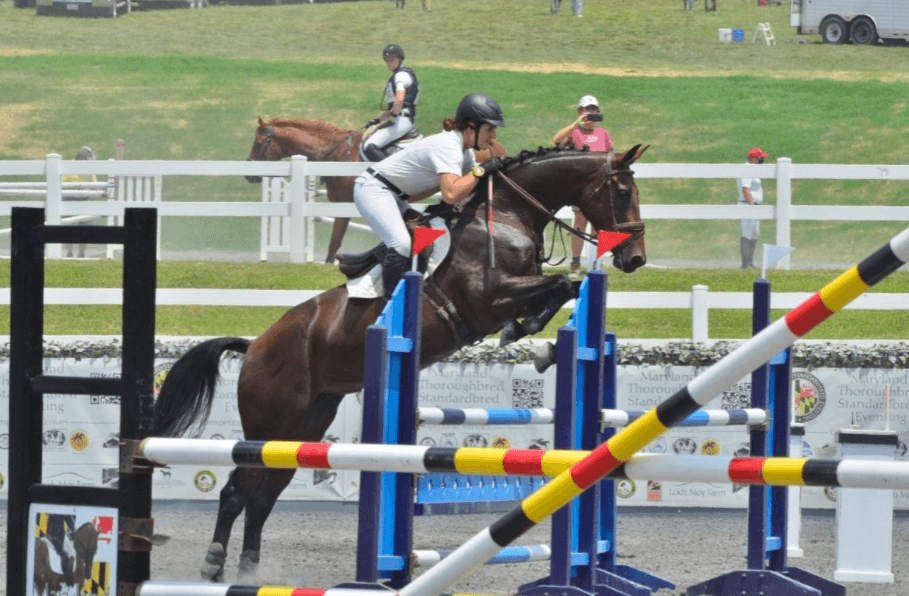
To Young Riders: The Case for Not Going Pro
So many young riders aspire to go pro, but here is a case for NOT going pro. Jumper Nation’s Ema Klugman weighs in.
Love what you do, and you’ll never work a day in your life. That’s what the inspirational speakers and books tell you.
Most young riders who spend their waking hours riding horses, taking care of horses, and thinking about horses face a choice in their early 20s: do I love this sport enough to try to make a go at it full-time? The answer to the first part is yes, most of the time — of course we love this sport. We wake up at ungodly hours just to drive long distances to be judged by other people and occasionally hit the dirt, and maybe sometimes we win a prize. But just because you love something doesn’t mean you have to monetize it and try to make your living out of it.
 Photo courtesy Ema Klugman.
Photo courtesy Ema Klugman.
Young riders (including me) who think they are better off not relying solely on horses for a source of income face two lines of criticism, sometimes overt but more often subtle and unspoken: the first is that they are not committed enough if horses are not their 24/7 lifestyle. The second is that they will never be good enough if they are distracted by another career. The last thing a hungry young rider wants to be told is that they lack commitment and will never reach the level to which they aspire.
However, there are numerous examples of amateur professionals who fund their competitive horse life with another career. Hinrich Romeike is perhaps the most famous example. The German dentist won both individual and team gold medals in eventing at the Olympic Games in Hong Kong.
I think we spend so much time idolizing the top level of the sport — whether it be the 5* competitions or the Olympic Games or World Championships, that we forget about all the other milestones one can shoot for. The truth is that a very slim fraction of very good riders will ever make it to the very top level, and even fewer will represent their country. That does not mean that one shouldn’t aspire to such a level. Having this inspiration is what helps up our game every day we sit in the saddle. However, young riders should remember that even if they make it to the Olympic games, that is only one week of thousands of weeks of their lives.
The other thousands of weeks will be spent doing things you may not really want to be doing: training rogue horses, trying to sell horses, teaching lessons, having to sell your own horses if you can’t afford to keep them… the list goes on. That’s not to say that day-to-day life can’t be satisfying: the process can be just as rewarding as the result. But the necessity to monetize this sport means that you have to create value in some form, and that creating that value may not actually be that fun for you. The problem with horses is that the running costs of keeping them are so high. To afford to keep your own horses, you have to have a high ratio of other horses in your program that are making you money. Furthermore, this professional horse life will be stressful because it will be so varied and unpredictable: you might sell three horses one month and zero horses for the next six months. It is difficult to create a steady stream of income, never mind being able to afford health insurance.
The other part of this conversation is safety. If you are riding 10+ horses each day as a professional (and normally not all of them are perfectly behaved!), your likelihood of getting hurt is much higher than if you just ride two horses a day. In that latter scenario, when you are funding your habit with another job, you are cutting down on the risk that comes with using horses to bring in income. Injuries bring enormous uncertainty to a professional rider’s business model. If they are unable to ride and don’t have an employee who rides well, they cannot sell horses easily, they cannot compete, and they may risk losing owners who want their horses going.
I see so many kids with Instagram accounts called “[their name] Eventing” or “[their name] Show Jumping]” as if they are already building a brand for a future business. Some of these kids are nine years old! I just hope they consider all the possibilities open to them before being funneled into the very narrow horse world.
You can love this sport and spend some or even most of your time doing something else. And you shouldn’t feel guilty about that. You’ll probably be healthier, happier, and may even find a job that you really love. You will be less likely to burn out of riding. Before or after work, and on the weekends, you can still be just as serious about riding horses. But if you never look into other fields, you won’t ever know what’s out there on offer.




